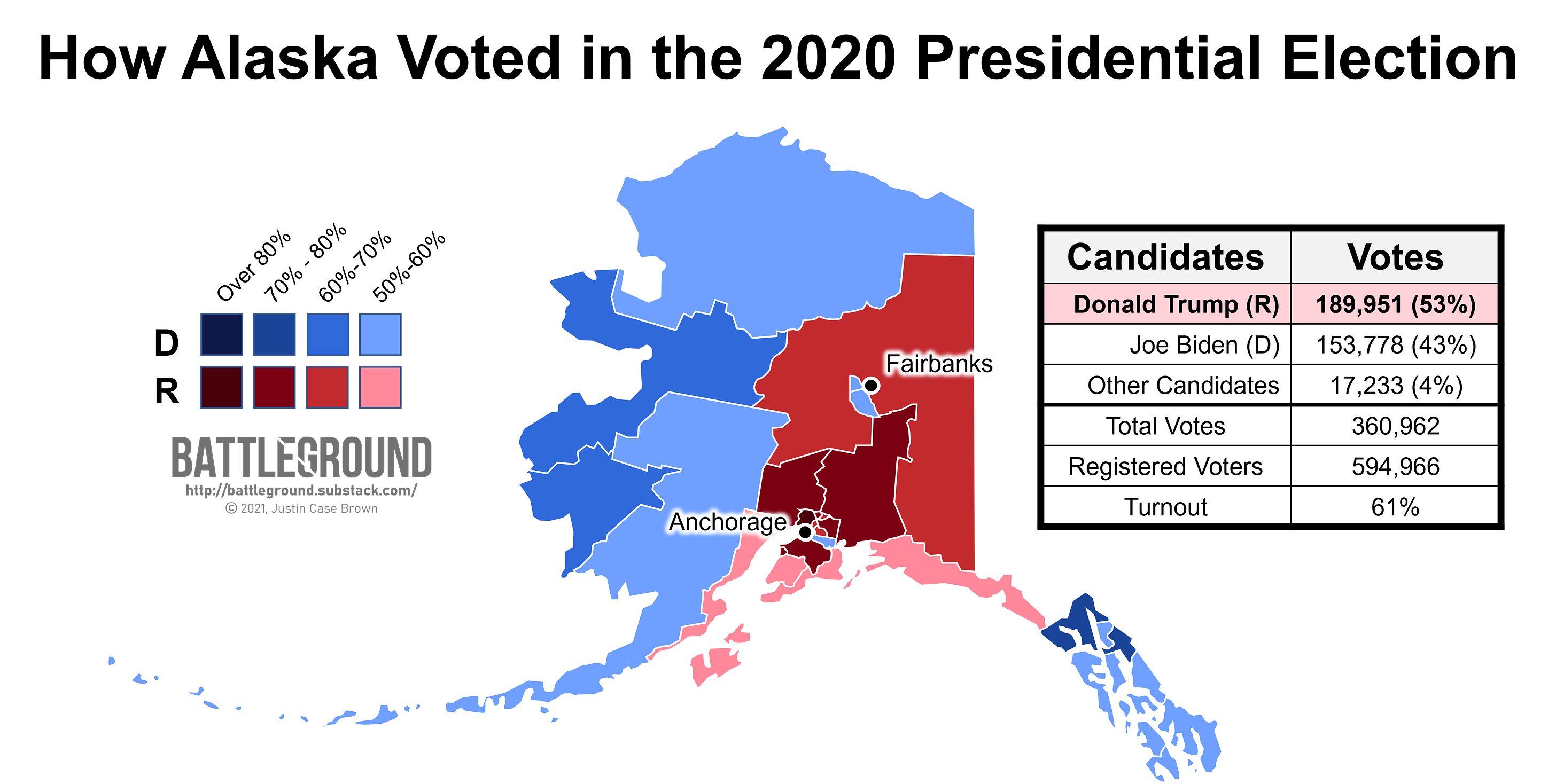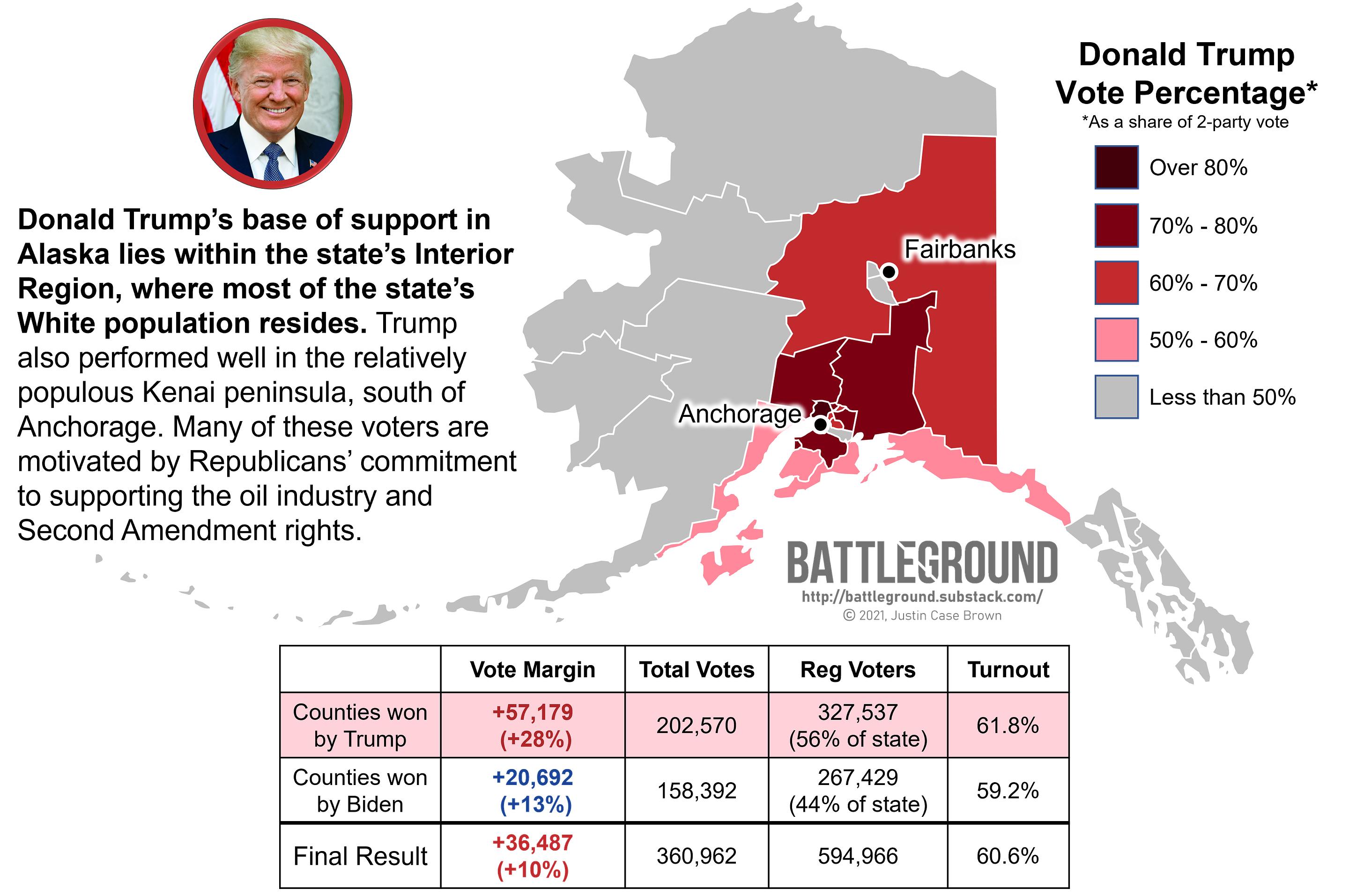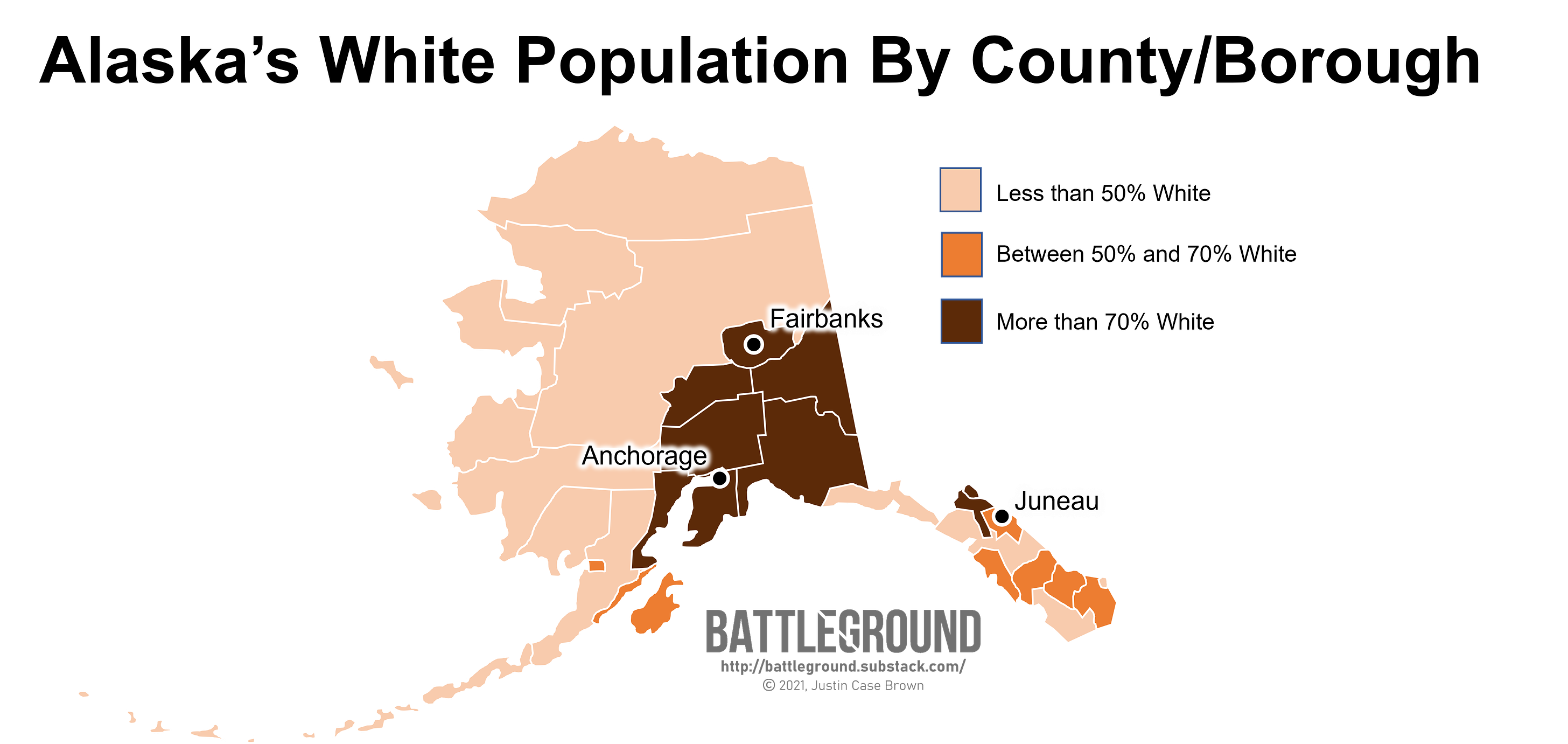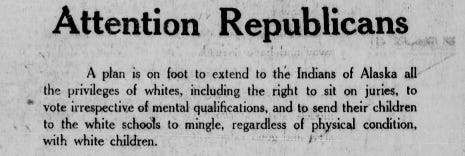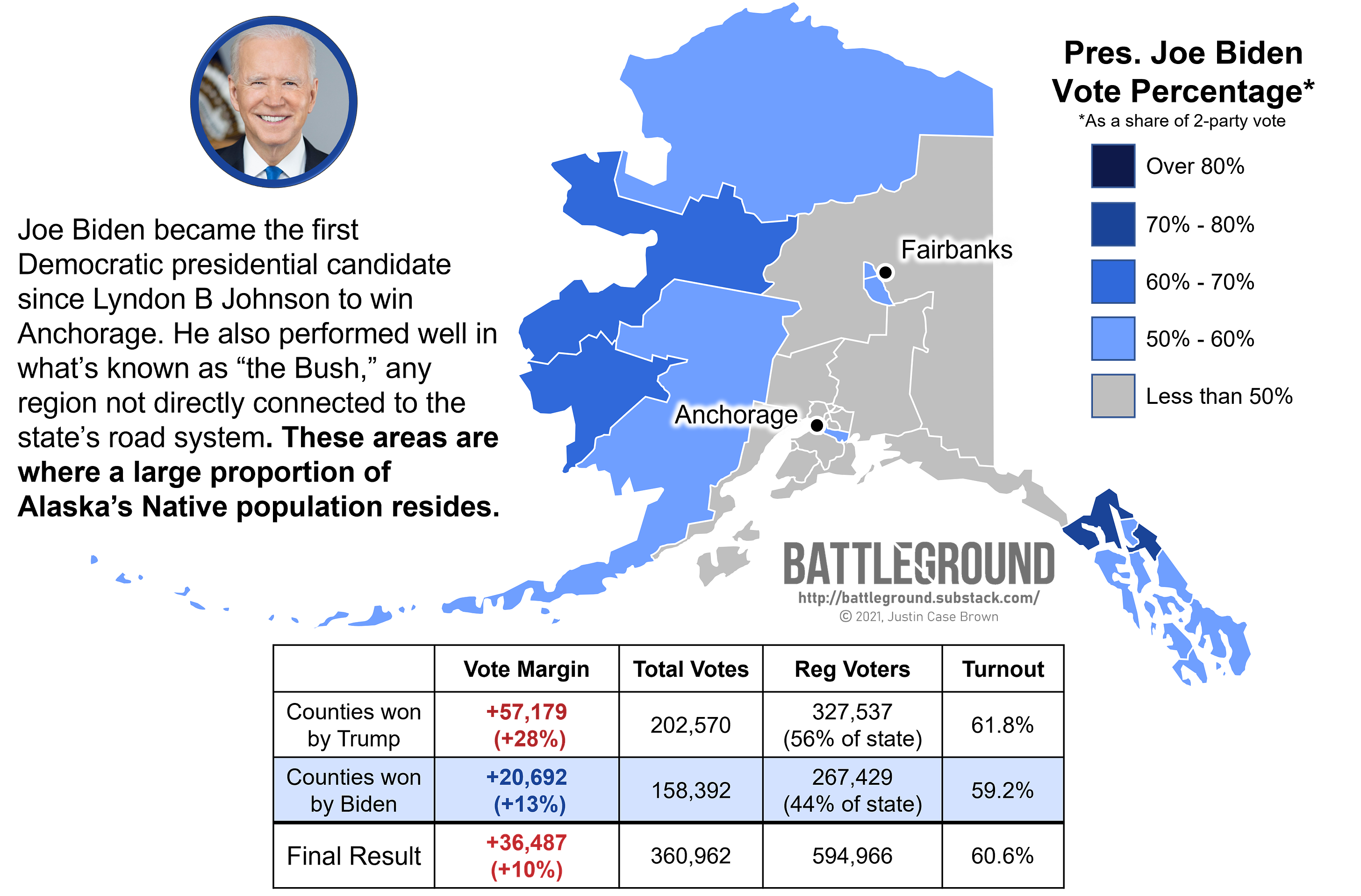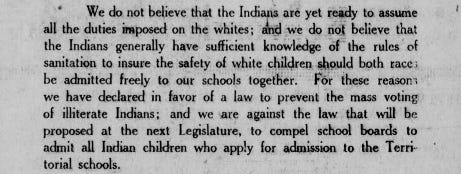Battleground - Alaska Flips Blue: Peltola Beats Palin
Battleground is a reader-supported publication. Consider supporting the newsletter through Buy Me A Coffee. Alaska Flips Blue: Peltola Beats PalinAlaskan Natives receive representation in the US House for the first time in American history.
Hi everyone. If you haven’t heard, Alaska just made history! Democrat Mary Peltola was just announced the winner of Alaska’s special US House election over former Republican Gov. Sarah Palin. Peltola is the nation’s first Alaskan Native to serve in Congress. She’s also the first woman to represent Alaska in Congress and the first Democrat to hold Alaska’s only House seat since 1972. (Alaska’s US House seat has sat vacant ever since the death of Republican Rep. Don Young in March 2022. This win means that Democrats will hold the seat for the remainder of this year. November’s general election will essentially be a rematch between Mary Peltola and Sarah Palin and will determine who holds the seat beginning in 2023.) This win is truly historic for Alaskan Natives: an ethnic population that has been routinely disenfranchised by Republicans even before Alaska achieved full statehood in 1959. Today, I wanted to recount that history via a re-issue of my post covering the 2020 presidential election. The contours of the last election’s results map out a cultural divide in Alaska that’s powered by racism familiar to African Americans in the continental United States. Topline Takeaways
In-Depth InsightsDonald Trump won Alaska for a second time, continuing Alaska’s streak of voting for every Republican presidential candidate since 1968. His strength comes from the predominately white areas of the Alaskan Interior where he won the city of Fairbanks. While Joe Biden ran on a pledge to reduce emissions by reducing the size of the domestic oil and gas industry, Trump promised to expand it. The petroleum sector is a critical driver of Alaska’s economy, supplying the state with roughly 30% of its jobs. The Republican party also aligns well with many Alaskan voters’ commitment to the Second Amendment as nearly two-thirds of Alaskan adults own a gun. Altogether, the Republican party platform is particularly attractive to the state’s White population and as a result the whitest areas of the state regularly break toward the GOP. However, it’s important to note that this geography is no accident. Alaska has the largest Indigenous population within the United States, currently sitting just above 15%. But the United States’ settlement and annexation of Alaska was marred with racism. Gold rushes in the early 1900s convinced White American settlers to make the long trip up north and the region was officially recognized as a United States territory in 1912. As settlements in the area grew, Indigenous peoples were met with epidemics on initial contact, social segregation, forced relocation and political exclusion. Joe Biden performed most strongly in the more diverse areas of the state where Alaskan Natives makeup a higher proportion of voters. Much of this is known as “the Bush” as these are areas not directly connected to the state’s road system. One major reason why Biden was able to gain ground in these areas was his opposition to the Trump administration’s relaxing of climate policies which included increased drilling and mining in the Alaskan wilderness. Further industrialization in these areas could devastate the ecosystems that many Alaskan Natives rely on for sustenance. In addition to the state’s hinterlands, Biden also became the first Democrat to win Anchorage, the state’s largest city. Despite this win, Biden’s more multicultural coalition was not large enough to overcome Trump’s and this is due, in part, to Alaska’s long history of voter disenfranchisement. Early efforts to curtail the political participation of Indigenous peoples began with their exclusion from citizenship. Alaska’s 1915 Territorial Act explicitly denied citizenship to Alaskan Natives unless they denounced “any tribal customs or relationship” and adopted the habits of “civilized life.” While this provision was axed in 1924 with the passage of the federal Indian Citizenship Act, Alaska’s legislators acted quickly to keep the Indigenous peoples “in his place.” In 1925, led by Alaskan Republicans, the legislature instituted an English literacy test as a part of the voter registration process. The newspaper ad captured above was commissioned by the Alaskan Republican Party and lays bare their clear racist intent. This literacy test was enshrined in the state constitution when Alaska was admitted to the union in 1959 and was not repealed until 1970, five years after the Voting Rights Act was passed. After the literacy test was repealed, a large proportion of Alaskan Natives still struggled to vote since registration and ballot materials were only printed in English. (Over twenty different languages are spoken by Indigenous peoples across Alaska.) This still served as a de-facto literacy test and was meant to be addressed with the extension of the Voting Rights Act in 1975. The extension was designed to identify minority language populations across the country and mandate that these jurisdictions provide ballot materials in other written languages to increase access. Unfortunately, the focus on “written languages” created a loophole where Alaskan legislators did not have to comply with the law as many of the different languages spoken by Alaskan Natives are oral and have no written history. This language-based exclusion persisted for decades: in the 2008 presidential election, turnout for Alaskan Natives was 20 percent lower than the overall statewide turnout. As a result, the ACLU partnered with tribes from Bethel, Alaska and sued the state for failing to provide adequate election materials for speakers of the Yup’ik language. (EDIT: Rep. Peltola is a Yup’ik woman herself, underscoring the historic nature of her win.) After years of litigation, the state of Alaska settled in 2010 and agreed to furnish oral translators and poll workers who were fluent in the language. The problem persisted though for all other language communities as the state only instituted the language remedies for those within the Bethel Census Area. Alaskan Natives sued the state again in 2013, alleging that Alaska continued to exclude language minorities from the ballot box and submitted the state’s English-only “Official Election Pamphlet” as evidence. The courts ruled again in the favor of Alaskan Natives and ordered the state to supply language resources that were compliant with the Voting Rights Act. Forecasting the Future: Alaskan Natives still encounter numerous barriers to voting that hamper their electoral power. While Alaska has made progress on supplying the necessary materials to enfranchise people of all language backgrounds, disparities remain. Further compliance audits have found that Alaska is still not in compliance with the Voting Rights Act. In the 2016 election, auditors found that less than half of poll workers received the proper federally mandated training and that training was conducted exclusively in English by a non-Native speaker. In addition to the language barrier, Alaska’s difficult and expansive geography makes it difficult for voters in the Bush to access polling locations. Studies have found that numerous tribes are so isolated that they are forced to take a plane or a boat to cast their ballot, a journey too expensive or untenable for many. Even voting by mail is difficult for many Alaskan Natives as most do not have their own mailboxes and have to make long journeys to the closest post office. While these geographic barriers will always exacerbate the ease of voting, the state has dragged its feet throughout its history in efforts to ensure all Alaskan residents have the ability to vote. As a result, the electoral landscape continues to favor Republicans as their voters are significantly more likely to have access than many Democratic voters. Leftover Links |
Older messages
Exploring the Urban-Rural Divide After Redistricting
Monday, August 29, 2022
Our nation's most rural and most urban congressional districts provide clear caricatures of Red and Blue America.
The Micropolitan Party: Republicans Embrace a Small-City Strategy
Thursday, August 25, 2022
The Democratic party's urban approach only focuses on cities of a certain size. Republicans are swooping in to pickup the smaller cities and towns that are often ignored.
Suburban Swing Districts in 2022
Monday, August 22, 2022
While Trump's rise has definitively shifted many suburban voters left, the following districts are still squarely in swing territory.
Battleground's Summer Recess
Tuesday, August 16, 2022
...and a mini summer reading list to tide you over!
Welcome to Trumpland: The Nation's Top 10 Reddest House Districts
Monday, August 8, 2022
American racism thrives in the wake of Trump's presidency.
You Might Also Like
AI chatbots keep failing every accuracy test thrown at them
Wednesday, March 12, 2025
PLUS: Why Substack's new subscriber milestone is so significant ͏ ͏ ͏ ͏ ͏ ͏ ͏ ͏ ͏ ͏ ͏ ͏ ͏ ͏ ͏ ͏ ͏ ͏ ͏ ͏ ͏ ͏ ͏ ͏ ͏ ͏ ͏ ͏ ͏ ͏ ͏ ͏ ͏ ͏ ͏ ͏ ͏ ͏ ͏ ͏ ͏ ͏ ͏ ͏ ͏ ͏ ͏ ͏ ͏ ͏ ͏ ͏ ͏ ͏ ͏ ͏ ͏ ͏ ͏ ͏ ͏ ͏ ͏ ͏ ͏ ͏ ͏
Everything We’ve Written About That’s on Sale at Nordstrom
Wednesday, March 12, 2025
Plus: Actually cute plus-size maternity clothes. The Strategist Every product is independently selected by editors. If you buy something through our links, New York may earn an affiliate commission.
What A Day: Bad Car-ma
Tuesday, March 11, 2025
Elon Musk's politics are sparking a major Tesla backlash, ironically thanks to Trump. ͏ ͏ ͏ ͏ ͏ ͏ ͏ ͏ ͏ ͏ ͏ ͏ ͏ ͏ ͏ ͏ ͏ ͏ ͏ ͏ ͏ ͏ ͏ ͏ ͏ ͏ ͏ ͏ ͏ ͏ ͏ ͏ ͏ ͏ ͏ ͏ ͏ ͏ ͏ ͏ ͏ ͏ ͏ ͏ ͏ ͏ ͏ ͏ ͏ ͏ ͏ ͏ ͏ ͏ ͏ ͏
Rohingya refugees just lost half of their food aid. Now what?
Tuesday, March 11, 2025
An interview with Free Rohingya Coalition what happened last week in Asia, Africa and the Americas Hey, this is Sham Jaff, a freelance journalist focused on Asia, Africa and the Americas and your very
Shayne Coplan’s Big Bet Is Paying Off
Tuesday, March 11, 2025
March 11, 2025 THE MONEY GAME Shayne Coplan's Big Bet Is Paying Off By Jen Wieczner Photo: Dina Litovsky At 6 am on Wednesday, November 13, eight FBI agents in black windbreakers burst through the
We need your input.
Tuesday, March 11, 2025
Share your insights & receive a 70% off forever.
We Talkin’ About Practice?
Tuesday, March 11, 2025
Nobody Told Me There'd Be Days Like These ͏ ͏ ͏ ͏ ͏ ͏ ͏ ͏ ͏ ͏ ͏ ͏ ͏ ͏ ͏ ͏ ͏ ͏ ͏ ͏ ͏ ͏ ͏ ͏ ͏ ͏ ͏ ͏ ͏ ͏ ͏ ͏ ͏ ͏ ͏ ͏ ͏ ͏ ͏ ͏ ͏ ͏ ͏ ͏ ͏ ͏ ͏ ͏ ͏ ͏ ͏ ͏ ͏ ͏ ͏ ͏ ͏ ͏ ͏ ͏ ͏ ͏ ͏ ͏ ͏ ͏ ͏ ͏ ͏ ͏ ͏ ͏ ͏ ͏ ͏ ͏ ͏ ͏
Seattle startup takes eco-friendly aim at recycling clothing
Tuesday, March 11, 2025
Read AI rolls out enterprise search tool | Hard time for hardware ADVERTISEMENT GeekWire SPONSOR MESSAGE: A limited number of table sponsorships are available at the 2025 GeekWire Awards: Secure your
☕ The beauty of it all
Tuesday, March 11, 2025
A conversation with Ulta Beauty's CMO. March 11, 2025 View Online | Sign Up Marketing Brew Presented By Iterable It's Tuesday. Count Kathy Hochul as an ad buyer. The governor of New York is
🤔 What’s in your wallet? A scam.
Tuesday, March 11, 2025
Plus, a new streaming deal is the latest gift to Trump from the billionaire CEO and his company — which profits off government contracts. Forward this email to others so they can sign up 🔥 Today on

